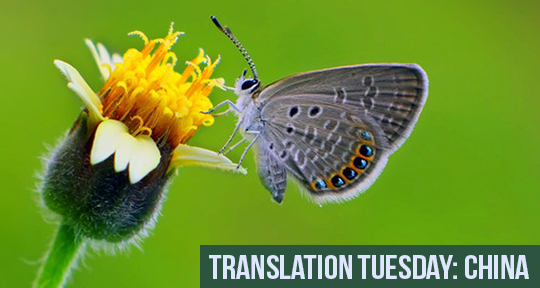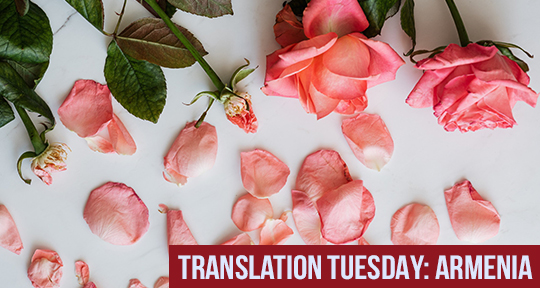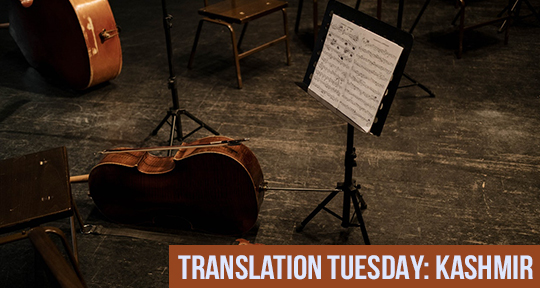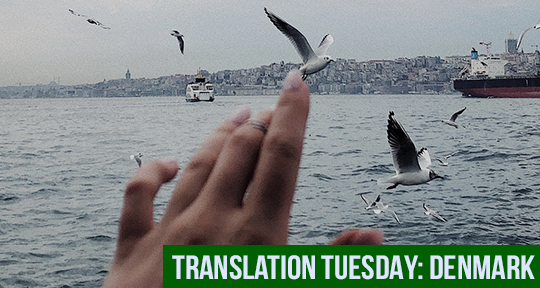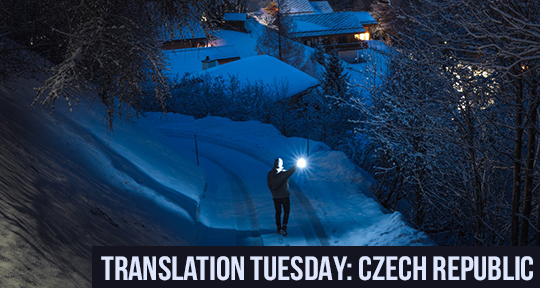Published on the day Denmark entered lockdown, Danish writer Rakel Haslund-Gjerrild’s award-winning novel All the Birds in the Sky follows a young, nameless protagonist who—in the submerged wasteland of a post-apocalyptic world—has to find her bearings in this strange landscape alone. The excerpt we are featuring this Translation Tuesday poignantly depicts a moment of aphasia that our narrator experiences as she attempts to grasp the language of her new world in all its ineffability. In a prose style that captures both the stillness of its depopulated setting and the urgency of our human desire for home, Haslund-Gjerrild’s voice is a unique one in the pages of climate fiction today. Equally pertinent is how, as co-translators Sophia Hersi Smith and Jennifer Russell show us, this novel demonstrates the role that words and translation can have at a time when the ground we stand on has never been more uncertain.
“All the Birds in the Sky begins with the wind reaching into a house and touching all the things inside—creating a sort of inventory, like a finger which points and names: knife, shovel, blankets, shoes, pails of grain, leaves. This taxonomizing wind awakens the main character, a young girl who is, we come to understand, the last human left on earth. It is a word that pulls her out of the murky depths of her slumber: why—a word that demands an answer, an explanation, a story. She uses word chains and associations to try to hold on, making up new terms for the ones she has forgotten.
As translators, we too search for words. In a work about losing language, our task was to find a vocabulary for and recreate the voice of a girl who was losing hers. The words themselves were important, of course: Haslund-Gjerrild’s language is much like the wind in this novel—simple and unadorned, it functions to reach out and touch, to grasp and hold. But even more central to this endeavor was the musicality of the text—its rhythm and movement. The girl’s journey in these first pages is felt as the steady beat of walking, the fluidity of thought, the slippage of memory, the momentum of searching. Much of the translation therefore came together not on the page, but by being spoken aloud. We read out the text, letting its sound and rhythm guide our choices—this word or that, a comma here or there, one sentence or two.”
—Sophia Hersi Smith and Jennifer Russell
Something darts past her, quick. Then again. Like a twitch in her eyelids. When she opens her eyes, the blue is full of black knives that draw lines between the houses. There’s a shrieking in her ears, a squealing, like knives being whetted, that’s how sharp the tongues and wings of the black cloud are, now drawing circles and figure-eights above her. Below her, the gentle thumping of the sea.
She lies there a little longer and tries to remember what Um called those birds. Their flat, metallic cries ring in her ears. A flock of flying birds that can say only one thing, which they repeat, again and again and again. She has always wondered what could be so important for them to say that a single word, almost just a scream, could suffice for an entire life. She can’t imagine what it might be. Maybe here-here-here-here.
Other birds prefer to fly alone, like the heron, which just is as it is. A quiet and precise bird. If she sees a heron staring at the water, she stops too and waits motionlessly with her net in hand. The heron is so still it stops time, not a single feather quivers. Only the rings of the raindrops in the water reveal that time is passing as usual, but then, a loud splash, and the next second the fish is in its beak. It swallows its catch whole and resumes its waiting. When it finally does say something, it speaks with the same precision with which it waits; a few hoarse calls that echo between the houses before it falls silent again.
Meanwhile, the little shriekbirds, maybe that’s what she should call them since she can’t think of the word, fly ceaselessly and cry ceaselessly. They always fly together, never alone, so there’s really no need for them to constantly call each other. Perhaps they’re not calling, perhaps they’re just shrieking us-us-us, for joy of flying together as one.
The shade is deep and the street is narrow, but apart from the quick, black slashes of birds, the strip of sky above her is blue. She stands and folds up the blanket. One of the birds shoots past her ear while she winds the tether around the door handle. Carefully she poles out onto the street, into the little birds’ morning frenzy. Um loved them, real city birds, Um said. Before the big fire, they had roosted in the houses on land, but now most houses are at sea. They lay their tiny eggs in nests of seaweed, grass and feathers in the houses’ cabinets and drawers, fly up and down the streets and over the rooftops, around and around until they crash into the windows. Sometimes the glass breaks and the bird hurtles into the house like a soft rock, but most often the glass holds and the bird tumbles into the water. READ MORE…


